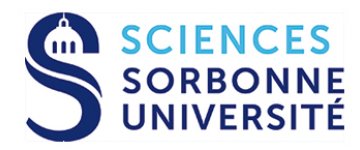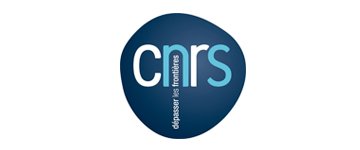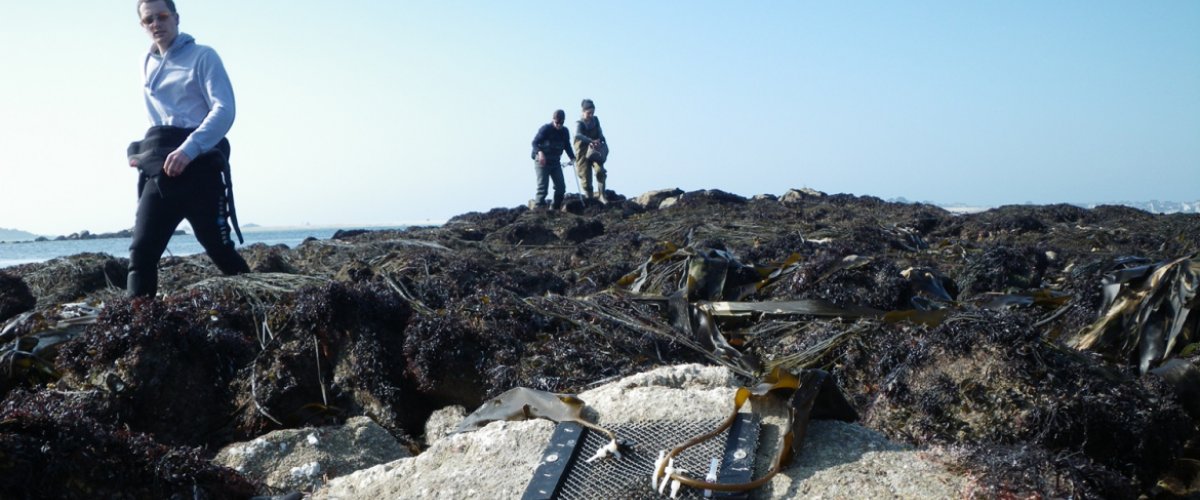Programs
Ongoing projects
FONDECYT: MAZZAELLA (2022-2026)
The objective of the FONDECYT "Mazzaella" project is to use three cryptic species in formation, all included under the taxonomic name Mazzaella laminariodes, as new biological models in the genomics of speciation. The project proposes to use the levels of hybridization and introgression between these three genetic entities to study the accumulation of genes that act as barriers to reproduction between species in the genomes of red algae.
IRL member involved: Marie-Laure Guillemin
NUCLEO MILENIO: MARINE AGRONOMY OF SEAWEED HOLOBIONTS (2022-2025)
Budget: 600.000.000 Pesos (666.000 Euros) répartis sur 3 ans, renouvelable 1 fois.
The project is structured around 3 axes: 1. Studying the determinants of traits of interest for aquaculture, by characterizing the respective role (and their interaction) of the algal genome, environmental parameters and the composition of the microbial biofilm. The ultimate goal is to develop a genome-scale metabolic network model for Gracilaria chilensis and Macrocystis pyrifera. 2. Investigate breeding/propagation strategies that maximize selection efficiency. We will analyze the effects of partial clonality, sexual reproduction, parthenogenesis, self-fertilization and the production of hybrids over 3 or 4 generations in order to test certain expected theoretical models (in particular those developed in Clonix 2). We will also examine how microbial communities react to these different strategies, in order to test in particular whether a part can be transmitted vertically, and therefore contribute to the response to selection. 3. Propose strategies for the management of the genetic resources of cultivated algae, with in particular the consolidation and formalization of our culture collections, and the establishment of pilot productions with local producers.
IRL Member involved: Sylvain Faugeron (Directeur adjoint), Marie-Laure Guillemin
FONDECYT: DECIPHERING THE DOMESTICATION OF A SEAWEED HOLOBIONT (2022-2026)
Budget: 218.800.000 Pesos (243.000Euros) repartis sur 4 ans.
The project continues the study of Gracilaria chilensis on the determinants of certain traits that the algae expresses under mariculture conditions. We will continue to analyze possible signatures of selection in the algal genome, and we will include the role of microbial (bacterial) biofilm. We will seek to determine the interaction between the genotype of the algae, the composition of the biofilm and certain environmental parameters on the rate of growth, fecundity and resistance to epiphytes. We will also test the effects of mariculture practices (clonal or via spores) on these interactions. The project includes lab and field experiments, as well as Hi-Plex genotyping, metabarcoding and sequencing of metagenomes.
IRL member involved: Sylvain Faugeron (porteur et coordinateur), Marie-Laure Guillemin
Selfrecomb ( 2018-2022)
Evolution de la recombinaison sous I'autofécondation partiel
IRL member involved: Denis Roze, Roman Stetsenko (PhD)
NERC-CONICYT (2019-2022)
"Structure, connectivity and resilience of an exploited ecosystem: towards sustainable ecosystem-based fisheries management"
IRL member involved: S Faugeron
Clonix2D (2018-2023)
“Les conséquences génétiques de reproduction partiellement clonale dans les populations colonisant de nouveaux territoires”
IRL member involved: Marie-Laure Guillemin et Myriam Valero
FONDECYT (2018-2022)
"Speciation and adaptation in marine diatoms and cocolotophores"
IRL member involved: P. von Dassow (Coord.) et S Faugeron
INSTITUTO MILENIO DE OCEANOGRAFIA (end 2018 or 2023 with extension ).
During the last decade important understanding of the functioning of the Humboldt Current System has been achieved, but still very little is known about the vast adjoining ocean region and the mesoscale activity connecting coastal to deep sea environments. Through the Millennium Science Initiative, "Instituto Milenio de Oceanografía" seeks to establish a recognized international center dedicated to the study of globally relevant physical, biogeochemical and ecological processes in the open ocean, and to explore key under-studied deep and abyssal pelagic ecosystems associated with submarine mounts, oceanic islands, and the Atacama Trench.
IRL member Involved: Peter von Dassow.
>>>>> Past projects
>FONDECYT (2017-2020, coord: M-L Guillemin)
"Deciphering the complex evolutionary history of a domesticated red alga within the Pacific Ocean using population genomic."
IRL member involved: M-L Guillemin, S Faugeron, M. Valero, C. Destombe
>GENIALG PROJECT (END 2020)
Seaweed, or “macro-algae”, has long been recognised as a valuable source of diverse bioactive compounds and has great potential to be used in pharmaceuticals, nutraceuticals and functional foods. However, until now, seaweed has been underexploited in Europe due to the challenges of expanding seaweed biomass production: costs need to be reduced, scales of production need to be increased, quality improved, and seaweed biomass needs to be successfully refined into multiple useful products. If these issues can be addressed, seaweed biomass production could become more economically and environmentally sustainable.The Horizon 2020 Blue Growth project GENIALG is the first industry-driven project bringing together pioneering companies in large-scale integrated European biorefineries and experts in seaweed cultivation, genetics and metabolomics to boost the seaweed industry.
GENIALG will boost the Blue Biotechnology Economy in Europe by designing high yielding seaweed cultivation systems. GENIALG will increase the production and sustainable exploitation of two high-yielding species of European seaweed biomass: the brown alga Saccharina latissima (also known as Sugar Kelp) and the green algae Ulva rigida (often called Sea Lettuce).
IRL members involved: Myriam Valero, Stéphane Mauger, Jérôme Coudret.
>MARFOR PROJECT (end 2020)
Marine forests support major ecosystem functions along the coastlines of Europe.These ecosystems, structurally formed by large brown algae such as kelp and fucoids, have undergone major range shifts that left imprints in contrasting population traits along each species range. Their expected restricted connectivity causes climate-driven range shifts to create homogeneous lower diversity along expansion zones, leaving behind in ancient presently warmer stable ranges unique diversity and traits that are increasingly threatened. Changes in marine forest ranges and adaptive traits can affect stakeholders in many ways, from loss of entire forests and services, to loss of adaptive traits and of blue growth potential linked with genetic resources, aquaculture and other seaweed-derived industries.
MARFOR aims to understand past and predict future consequences of global change for biodiversity of marine forests.
IRL members involved: Myriam Valero, Christophe Destombe, Stéphane Mauger, Jérôme Coudret, Sylvain Faugeron
>FONDECYT (2016-2020)
Balance between historical demography, population connectivity and local adaptation in shaping the distribution along a latitudinal gradient of a cosmopolitan species, the kelp Macrocystis pyrifera"
IRL member involved: S Faugeron (Coord.) et M. Valero
>IDEALG project (investissement d'avenir, 2012-2022, coord. Philippe Potin, SBR)
Algal genomics and post-genomics.
IRL members involved: M Valero, C Destombe, S Mauger, S Faugeron, M-L Guillemin, Chloé Jollivet, Marion Ballenghien, Jaromir Guzinski, Komlan Avia, Alejandro Montecinos, Bertrand Jacquemin.
>GENASEX (2017- 2021)
Génomique de la clonalité: une nouvelle approche basée sur le sexe chez des asexués
IRL member involved: Denis Roze
>FONDECYT (2013-2017, coord: A. Brante, Universidad Catolica de la Ssma. Concepción, Chile)
“Mega disturbances and population genetic resilience in the marine realm: the role of life history strategies”.
UMI member involved: M-L Guillemin.
>SEXCHANGE (ANR Jeune Chercheur, 2014-2018, coord. Denis Roze)
"The evolution of sex in spatially and temporally changing environments"
UMI member involved: Denis Roze
>FONDECYT 1141106 (end March 2018)
Naturally high pCO2 upwelling in Chile: Effects on phytoplankton communities, the coccolithophore Emiliania huxleyi, and interactions with iron and macro-nutrients.
UMI member Involved: P von Dassow.
>FONDEQUIP EQM130267
Flow cytometer for microbes with biogeochemical activities.
UMI member involved: Peter von Dassow
>FONDEQUIP EQM130267
Flow cytometer for microbes with biogeochemical activities.
UMI member involved: Peter von Dassow
>NUCLEO MILENIO DE CONSERVACIÓN MARINA
The Center for Marine Conservation, launched in October 2011, is a research Nucleus of the Chilean Millennium Science Initiative (MSI). It was created to study one of the most productive marine ecosystems of the world, following four main lines of action of MS Nuclei: cutting-edge scientific and technological research, training of young researchers, collaborative networking with national and international institutions and science outreach to the society.
UMI member Involved: Sylvain Faugeron
>FONDECYT (2013-2016, coord: M-L Guillemin)
“Understanding the biology of population isolation and divergence in the red alga Mazzaella laminarioides: test for historical and present gene flow between and within three lineages distributed in strict parapatry along the Chilean coast”.
UMI member involved: M-L Guillemin.
> Clonix project (ANR 2012-2015, programme blanc, coord. Sophie Arnaud-Haond, Ifremer Sète)
"Revisiting the population genetics and genomics of clonal organisms". Populations genetics studies on Ectocarpus spp and Alexandrium minutum; theoretical models on estimation of clonality rates.
UMI members involved: M Valero, C Destombe, M-L Guillemin, D Roze.
> INACH REGULAR T_16-11 (2012-2015, coord: M-L Guillemin)
“Biodiversity of Southern Ocean Seaweed: first local and regional insights using a molecular-assisted alpha taxonomy approach”.
UMI member involved: M-L Guillemin.
> TRANS project (ANR programme blanc, 2012-2015, coord. Sylvain Glémin, ISEM Montpellier)
"Breeding systems transitions in flowering plants and their evolutionary consequences". Project including theoretical approaches (evolutionary dynamics of mating systems transitions, consequences of selfing on genomic architecture) and genomics on different angiosperm species.
UMI members involved: D Roze.
> CONICYT Chile-USA 20120014 (2011-2015)
"Signatures of selection in planktonic microbial communities and populations due to changing oceans”. Co-investigators Rodrigo De la Iglesia (PUCCH), Nicole Trefault (U Mayor), Osvaldo Ulloa (UdeC), and Bess Ward (Princeton, USA).
UMI member involved: P Von Dassow.
> Hy-Sea project (ANR 2013-2016), programme blanc, coord. Frédérique Viard, SBR)
"Hybridization, a pivotal but neglected contributor to marine biodiversity dynamics". Study of hybridization processes, theoretical aspects and genomics on different marine invertebrate species.
UMI member involved: Denis Roze.
> CONICYT USA 2012 (end October 2015)
Signatures of selection in planktonic microbial communities and populations due to changing oceans.
UMI members involved: Peter von Dassow
> FONDECYT 3120013 (end October 2014). Genomic and functional variation correlated with stress responses in the cosmopolitan coccolithophore Emiliania huxleyi.
UMI members Involved: D Mella, P von Dassow.
> BiCycle project (ANR, programme blanc, 2011-2014, coord. Mark Cock, SBR): exploring the life cycle of Ectocarpus: which genes are responsible of the alternance of generations? What is the life cycle and reproductive mode of natural populations? Do haploid and diploid individual have different ecological niches? Theoretical and experimental aspects.
UMI members involved: M Valero, C Destombe, S Mauger, D Roze, L Couceiro, M Rescan.
> Paralex project (ANR 6ème extinction, 2010 - 2014, coord. Laure Guillou, SBR): Understanding host-pathogen dynamics and life cycle within toxic blooms of the dinoflagellate Alexandrium minutum.
UMI members involved: C Destombe, S Mauger, A Dia.
> Marinexus project (European Interreg project, end in 2014, coord. Mark Cock, SBR): "Our shared sea: mechanisms of ecosystem change in the Western Channel". Workpackage 4: identification of sex-linked markers in Ectocarpus; experiments on the regulation of the life cycle of Ectocarpus.
UMI members involved: M Valero, C Destombe, D Roze.
> FONDECYT 1110575 (end March 2014): "Genome evolution in the most abundant cosmopolitan coccolithophore Emiliania huxleyi, a keystone species providing model for understanding the capacity of phytoplankton to adapt in a rapidly changing ocean”.
UMI members involved: P Von Dassow, D Roze.
> Emergence projet (Univ Paris 06, 2010-2013, coord. S Coelho, SBR): study on genetic sex determination in Ectocarpus siliculosus, evolution of male-female differentiation.
UMI member involved: D Roze.
> Hi-Flo project (ANR programme blanc, 2009-2012, coord. Nicolas Bierne, ISEM Montpellier): "The genetic basis and history of adaptive differentiation in high gene flow marine species". Genome scan approaches to detect local adaptation in different marine invertebrates, theoretical aspects on hithhiking in structured populations and reproductive isolation.
UMI member involved: D Roze.
> FONDECYT project to M-L Guillemin: " Evolution of ploidy level and breeding system: using a red alga, Gracilaria chilensis, as a model for in vivo tests of existing theories on the evolution of sex and life cycles ".
UMI members involved: M-L Guillemin, M Valero, C Destombe, D Roze.
> Aquactif project: "Développement de nouvelles productions aquacoles d’algues marines bretonnes pour des applications cosmétiques" (coord. F. Nicolas, Agrimer, Pôle Mer / Ministère Industrie).
PhD thesis of Alexandre Geoffroy (co-supervised by C. Destombe and L. Le Gall), defended in november 2012.
> Assemble project: European network to improve marine stations infrastructure. Recruitment of a technician (Fiona Lerck) during 18 months, development of culture protocols for several model algae (Chondrus, Gracilaria, Fucus and Laminaria).
> Pioka project (ARED Région Bretagne et Europôle Mer / LIA DIAMS): PhD thesis of Stacy Krueger (co-supervised by J. Correa and M. Valero): life cycle, reproductive system and spatial structure of populations of Chondrus crispus (Rhodophyta) in Brittany.
> ECOKELP project (ANR biodiversté, 2007-2010, coord. Myriam Valero): Biodiversity dynamics of Southern and Northern hemisphere kelp forests, including its societal and economical impacts. Study of reproductive systems in Lessonia and Laminaria, local adaptation, demography and ecological importance of the gametophytic stage.
UMI members involved: M Valero , C Destombe, S Faugeron.
No results







